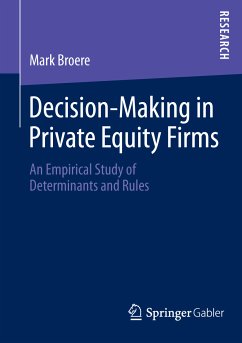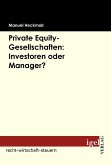The decisions of private equity firms affect the development of industries and national economies, yet little is known about how these decisions are made. Mark Broere uses proprietary survey data from 136 private equity firms (venture capital and buyout) located in the US, Canada, and Europe to explore determinants and rules of their decision-making. The results exhibit new facts about their objectives, success measures, decision criteria, exit decision power and rules. A discussion in light of existing financial theory highlights, e.g., the role of reputation, and potential pitfalls in the decision-making of practitioners. The author suggests that private equity firms might improve their performance by a more careful choice of decision rules and criteria and by a more consistent application of these across varying decision types.
Contents
- Objectives and minimum return requirements of private equity firms
- Success measures and decision criteria employed by private equity firms
- Exit decisions
Target Groups
- Researchers and students with a focus on private equity and finance related fields
- Investors and professionals in the private equity industry
The Author
Mark Broere has worked for many years in mergers and acquisitions, advising private equity firms and corporate clients on takeovers and exits; he completed his doctoral dissertation under the supervision of Prof. Dr. Klaus Serfling at the Brandenburgische Technische Universität Cottbus-Senftenberg.
Dieser Download kann aus rechtlichen Gründen nur mit Rechnungsadresse in A, B, BG, CY, CZ, D, DK, EW, E, FIN, F, GR, HR, H, IRL, I, LT, L, LR, M, NL, PL, P, R, S, SLO, SK ausgeliefert werden.









